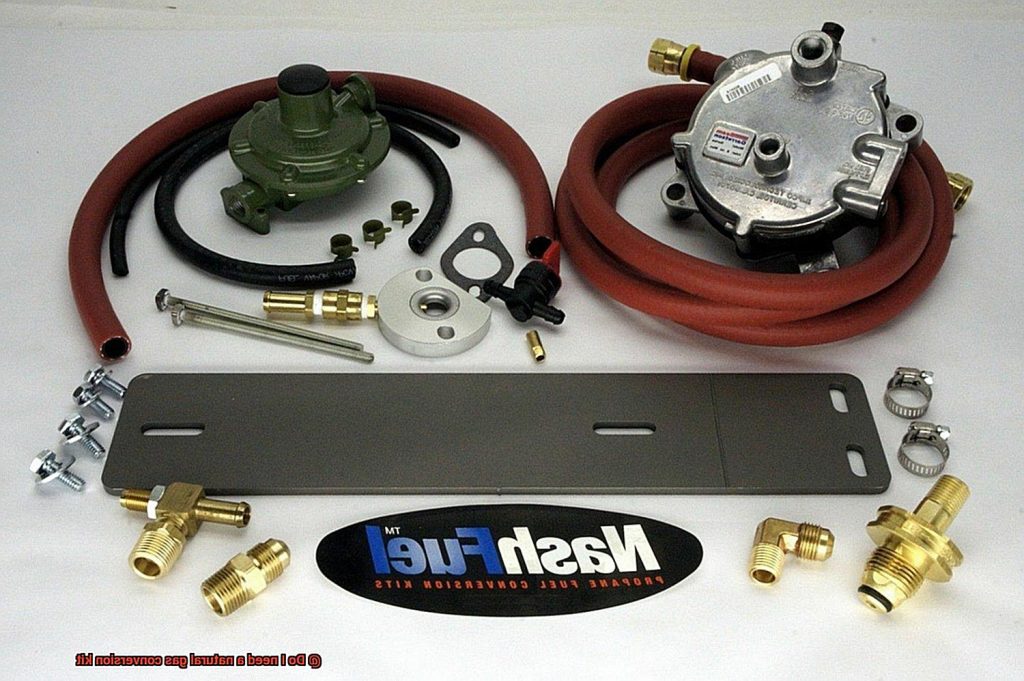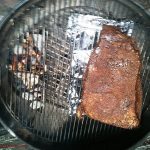Are you thinking of switching to natural gas appliances? You’re not alone. Many homeowners are making the switch to enjoy the benefits of energy efficiency and safety. However, before you make the switch, there’s one question that might be bugging you – do I need a natural gas conversion kit?
The answer is not as simple as yes or no. Natural gas appliances operate on a lower pressure than propane appliances, which means they require a different type of fuel delivery system. To make the switch, you’ll need a conversion kit. But here’s where it gets tricky – different appliances have different requirements.
Some appliances might only need a burner or orifice change, while others might require more complex alterations to their internal components. And in some cases, certain appliances may not even be compatible with natural gas at all. It can be overwhelming trying to figure out what your specific appliance needs.
But don’t worry – we’re here to help. In this blog post, we’ll guide you through everything you need to know about natural gas conversion kits. We’ll explore which appliances require the kit and which ones don’t. By the end of this post, you’ll have all the information you need to confidently make the switch to natural gas. So let’s dive in.
Contents
What is a Natural Gas Conversion Kit?
A natural gas conversion kit may be just what you need. This set of components can convert your propane gas grill or other appliance to use natural gas instead.
Why switch to natural gas? For one, it is often a more economical and convenient fuel source for outdoor grilling. Natural gas is typically less expensive and more widely available than propane. Plus, with a natural gas hookup, you’ll never run out of fuel mid-grill again.
The conversion process involves replacing the propane regulator with one designed for natural gas and swapping out the burner orifices to ones that are sized properly for natural gas. The kit may also include a new hose and fittings to connect the grill to your home’s natural gas supply.
But before you rush out to buy a conversion kit, it’s important to note that not all grills are compatible with them. Check your grill’s owner’s manual or contact the manufacturer to see if a conversion kit is available and recommended for your specific model.
It’s also crucial that the conversion be done correctly and by a qualified professional. Improper installation can result in a dangerous gas leak or even an explosion. So, leave this task to the experts and ensure safety.
Do I Need a Natural Gas Conversion Kit?
Grilling is a beloved pastime for many, but choosing the right fuel can make or break your grilling experience. While charcoal and propane have been popular choices for years, natural gas has emerged as a cost-effective and reliable option. But if you’re currently using propane, you may be wondering: do I need a natural gas conversion kit?
The answer is a resounding yes. Propane and natural gas have different properties and require different equipment to operate. Propane is stored in a tank as a liquid and must be vaporized into gas when it’s released through the valve. Natural gas, on the other hand, is delivered through a pipeline as a gas and doesn’t need to be vaporized. This means that if you want to switch to natural gas, you’ll need a conversion kit that includes a regulator and new burners designed specifically for natural gas.
It’s important to note that not all grills can be converted from propane to natural gas. Some grills are designed for one type of fuel only and cannot be converted. If your grill can be converted, it’s crucial to have a professional perform the conversion to ensure it’s done correctly and safely.
By using a natural gas conversion kit, you’ll be able to grill with confidence knowing that your equipment is designed to operate safely and efficiently with natural gas. Plus, you’ll enjoy the benefits of lower costs and less waste compared to traditional propane tanks.
How to Tell if Your Grill Can Be Converted to Natural Gas
Consider converting your grill to natural gas, a more cost-effective and convenient fuel source. However, before you start the conversion process, it’s important to determine if your grill is compatible with natural gas. Here are five steps to help you determine if your grill can be converted:
Step 1: Check Your Owner’s Manual
The first step in determining if your grill can be converted to natural gas is to check your owner’s manual. Many grill manufacturers produce natural gas conversion kits specifically designed for their grills. These kits often include all of the necessary hardware and instructions for converting your grill to natural gas.
Step 2: Consider the Age and Condition of Your Grill
The age and condition of your grill can also impact its compatibility with natural gas. Older grills may be more difficult or expensive to convert due to outdated parts or wear and tear on the grill itself. It’s important to assess the condition of your grill before making any decisions about conversion.
Step 3: Determine the Type of Fuel Your Grill Uses
To determine if a natural gas conversion kit is needed, you’ll need to check the specifications of your grill and compare them to the specifications of the natural gas supply in your area. Most grills run on propane, but some may use other fuels such as charcoal or electric. If your grill runs on propane, then a natural gas conversion kit may be necessary if you want to switch to natural gas.
Step 4: Check Your Grill’s Specifications
Natural gas requires a higher pressure than propane, so it’s important to check the specifications of your grill’s regulator. If it is not designed to handle that pressure, then a conversion kit will be necessary. Additionally, the size of the gas line feeding into your home will also play a role in determining if a conversion kit is needed.
Step 5: Consult with a Professional
Converting your grill to natural gas can be a complex process, and it’s important to consult with a licensed professional before attempting the conversion. A professional can help assess the compatibility of your grill and provide guidance on the best course of action for your specific situation.
Types of Natural Gas Conversion Kits
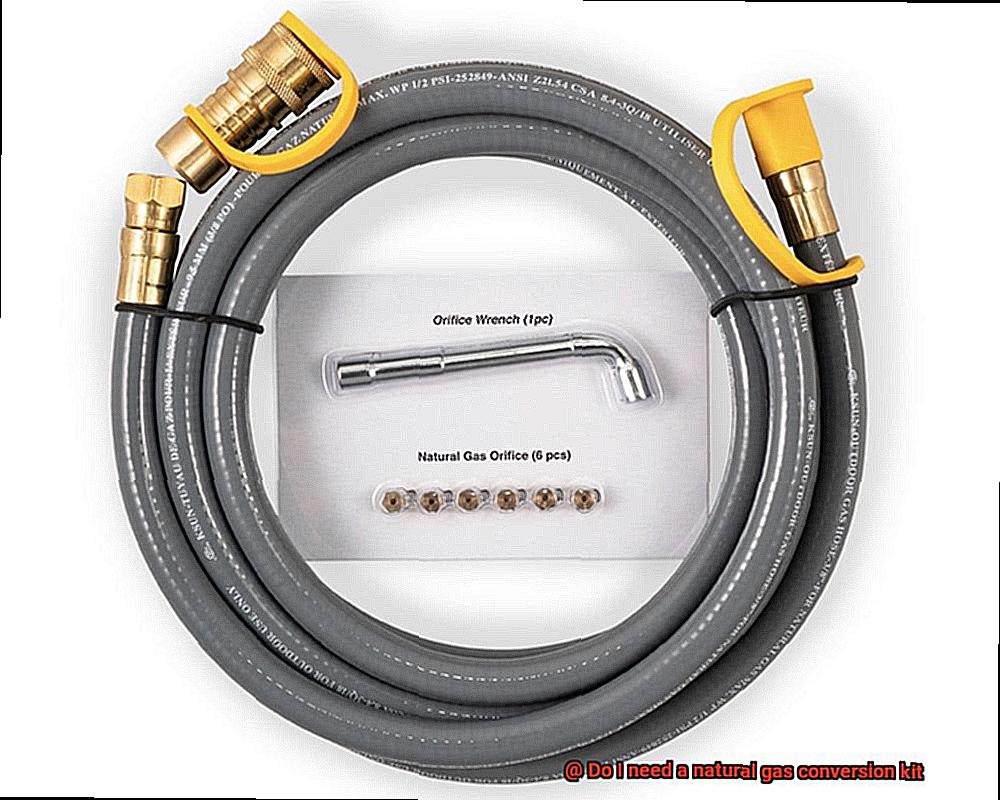
Natural gas conversion kits offer a great way to switch from propane to natural gas for your grill. However, there are several types of conversion kits available in the market, and it can be daunting to choose the right one that suits your grill’s needs. Here are five sub-sections that explain the different types of natural gas conversion kits and their features.
Orifice Conversion Kit:
The most common type of natural gas conversion kit is the orifice conversion kit. It comes with brass fittings that replace the propane orifices in your grill’s burners. These orifices regulate the flow of gas into the burners, and by replacing them with smaller-sized orifices that allow natural gas to flow through, your propane grill can be converted to use natural gas. However, not all grills are compatible with this type of conversion kit.
Dual-Fuel Conversion Kit:
With a dual-fuel conversion kit, you can switch between propane and natural gas easily, depending on your needs. This type of kit involves adding a secondary fuel source to your grill in the form of a valve attached to the fuel line. It is perfect for those who want to have the flexibility of using either fuel source.
Regulator Conversion Kit:
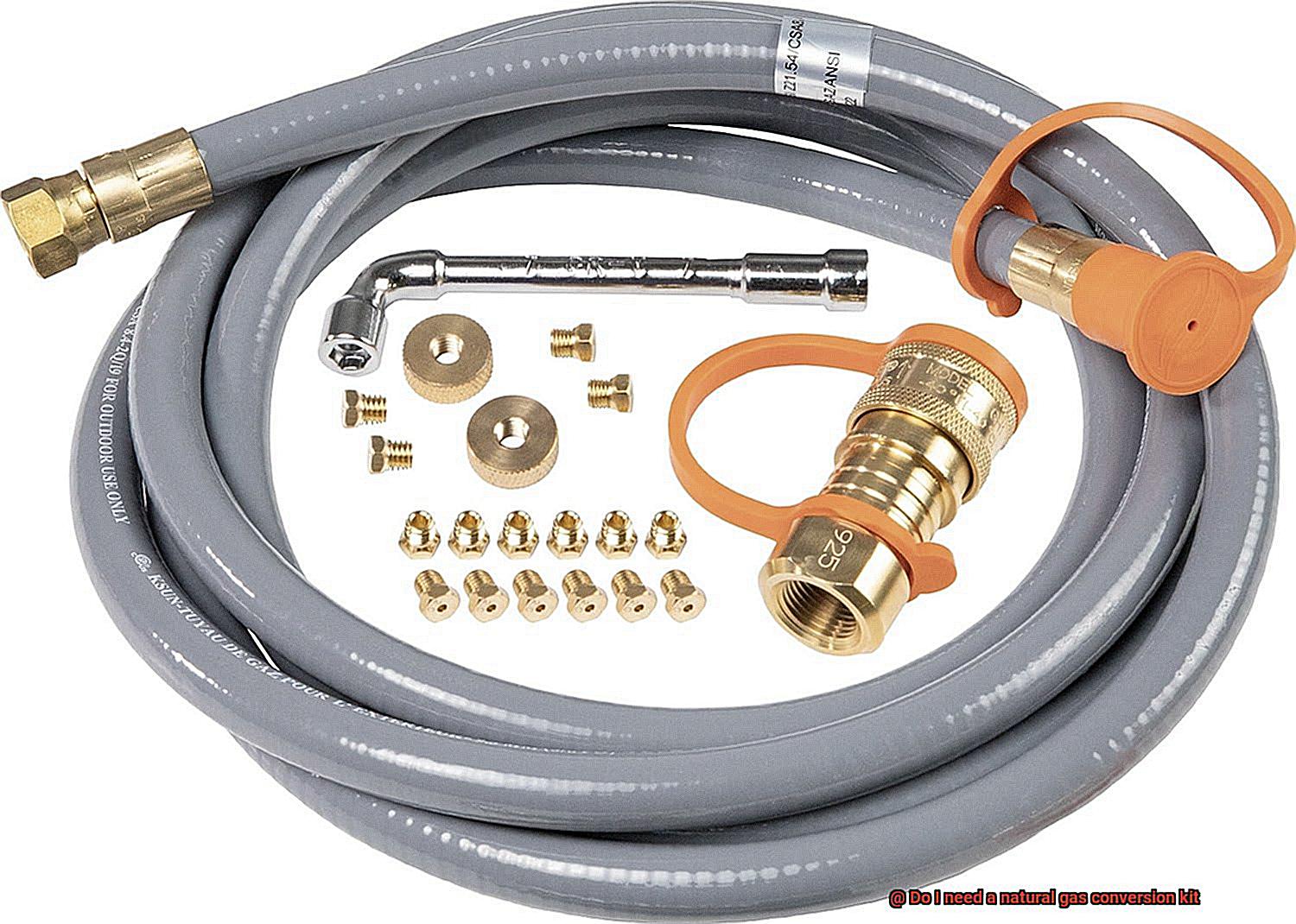
For grills that require higher pressure than what is typically provided by residential natural gas lines, a regulator conversion kit might be the best option. This type of kit replaces the standard regulator on your grill with one that can handle the higher pressure required for natural gas.
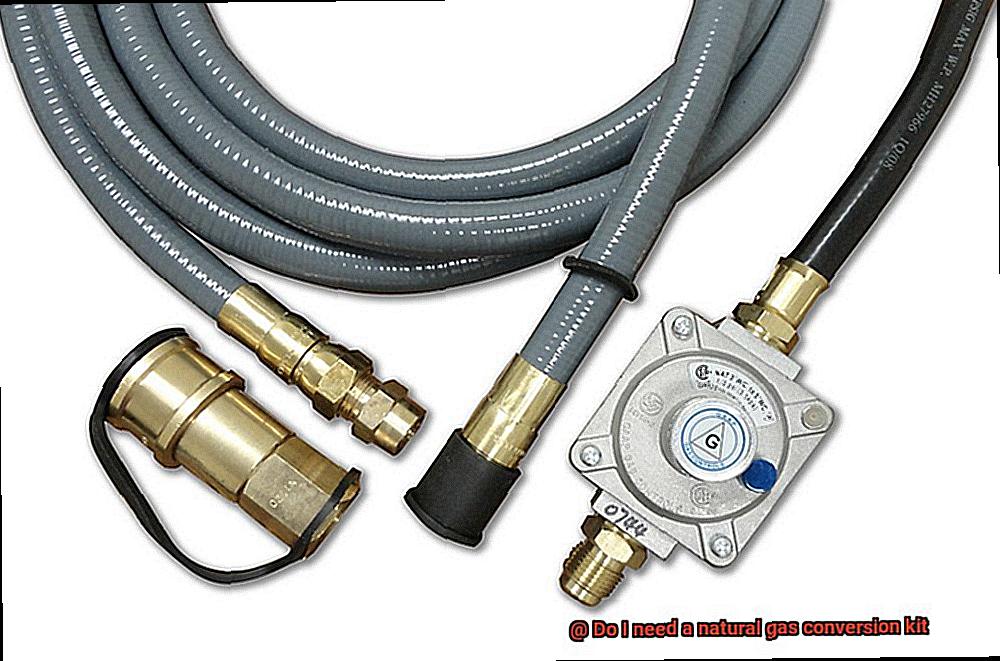
Universal Conversion Kit:
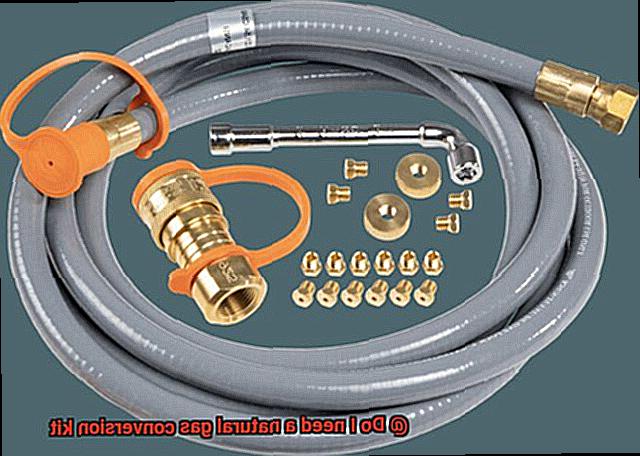
If you are not sure about which kit will work best for your grill, then a universal conversion kit might be your best bet. As the name suggests, this type of kit is designed to work with different types of grills and can be easily installed. It includes all the necessary components for converting your grill to natural gas.
Manufacturer-Specific Kit:
Some grill manufacturers offer their own conversion kits that are specifically designed for their products. These kits include all the required components for converting your grill to natural gas and are usually easy to install. However, they may be more expensive than universal conversion kits.
It is important to note that not all grills can be converted to natural gas, so it is essential to check with the manufacturer or consult an expert before purchasing a conversion kit. Additionally, it is highly recommended to have a professional install the conversion kit to ensure safety and proper functioning.
Benefits of Using Natural Gas Instead of Propane
Look no further than natural gas as your go-to grilling fuel. As an expert on the benefits of using natural gas instead of propane, let me highlight the reasons why this switch can revolutionize your grilling experience.
First and foremost, natural gas is a more cost-effective option. Who doesn’t love saving money? Natural gas is typically cheaper than propane, meaning that you’ll see significant savings over time by switching to this fuel source. Plus, with natural gas delivered directly to your home via pipeline, you’ll never have to worry about making last-minute trips to refill or replace tanks.
But it’s not just about the cost savings – using natural gas is also more convenient. Say goodbye to lugging heavy propane tanks around or worrying about running out mid-grill. With natural gas, you can fire up your grill without any worries and focus on enjoying your delicious food.
In addition to being cost-effective and convenient, natural gas is also an environmentally-friendly choice. It burns cleaner than propane, producing fewer emissions and less pollution. Plus, because it leaves less residue on your grill grates, cleaning up after your cookout will be a breeze.
What’s more, using natural gas for grilling provides consistent heat. Unlike propane which may lose pressure in colder temperatures, natural gas maintains a steady flow rate regardless of the weather conditions. This means that you can grill to perfection no matter the season.
If you’re considering making the switch to natural gas, be sure to talk to a professional about installing a natural gas conversion kit for your grill. There are many different types of kits available to suit your needs, from universal options to manufacturer-specific choices.
Installing a Natural Gas Conversion Kit
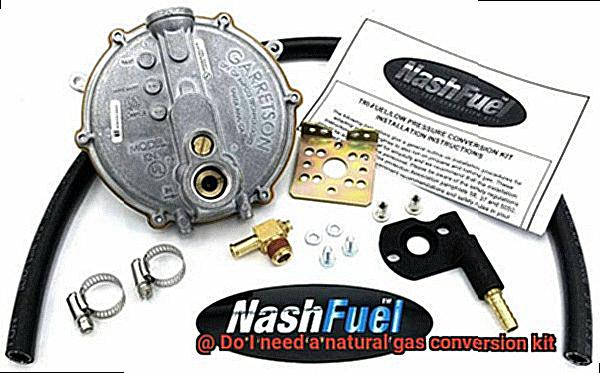
Well, it’s time to say goodbye to those pesky propane tanks and hello to a more cost-effective, convenient, and environmentally-friendly grilling experience – natural gas grilling. But before you can fire up your grill with natural gas, you need to install a conversion kit. As an expert in this area, let me walk you through the steps involved in installing a natural gas conversion kit.
First things first, it’s important to note that not all grills are compatible with conversion kits. Therefore, before you embark on this journey, check with the manufacturer to ensure that your grill is compatible. Once you’ve confirmed compatibility, you’re ready to move on to the next step.
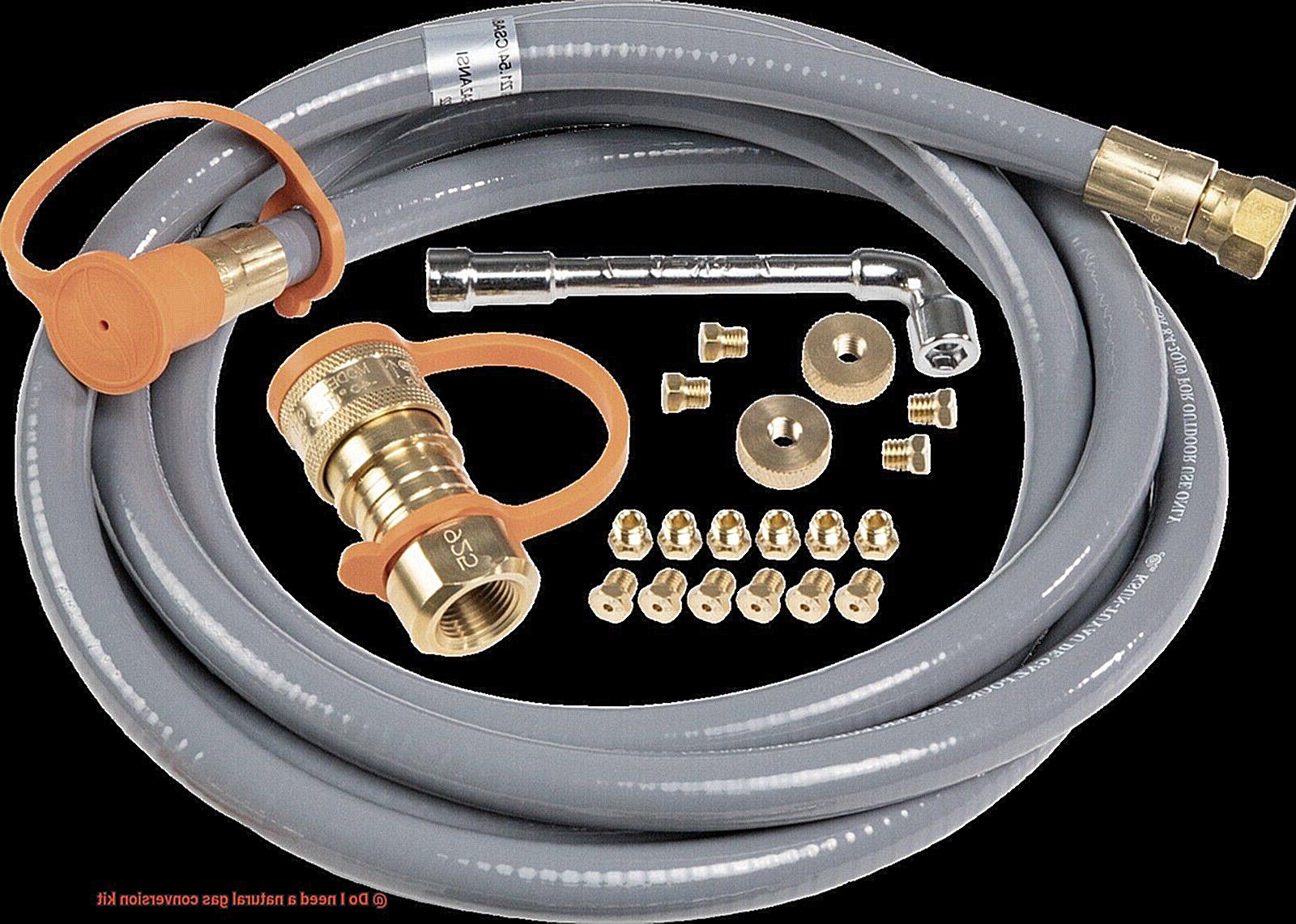
In order to begin the installation process, it is crucial to turn off the gas supply and disconnect the propane tank from your grill. Safety first. Once that is done, remove all components specific to propane, including the burners and regulator. Be sure to keep these components in a safe place in case you want to convert your grill back to propane in the future.
Now it’s time to install the natural gas specific components. This includes the new regulator, burner orifices and any other necessary parts. It’s important to follow the manufacturer’s instructions carefully during this process to ensure proper installation.
Once all components are installed, it’s time for a test run. Turn on the gas supply and light each burner individually to ensure they are working correctly. It’s also important to check for any gas leaks by applying a soap and water solution around all connections and checking for bubbles.
Necessary Equipment for Connecting a Grill to Natural Gas
Well, before you get too excited about the endless possibilities that come with this upgrade, it’s crucial to know the necessary equipment for connecting your grill to natural gas. Luckily, we’ve done the research and have all the details you need.
First and foremost, you will need a natural gas supply line. This connection is installed by a professional plumber or gas fitter and runs from your home’s natural gas line to the location where you plan to place your grill. It’s essential to make sure that this connection is secure and properly installed to avoid any accidents or leaks.
Once you have your supply line set up, the next piece of equipment you’ll need is a natural gas regulator. This device regulates the flow of gas and ensures that pressure remains consistent. Choosing a regulator that is compatible with your specific grill model and amount of gas pressure required is essential to make sure everything runs smoothly.
In addition, if your grill is currently designed to run on propane, then you’ll need a conversion kit to switch it over to natural gas. This essential kit includes specialized burners, valves, and other components specifically designed to work with natural gas.
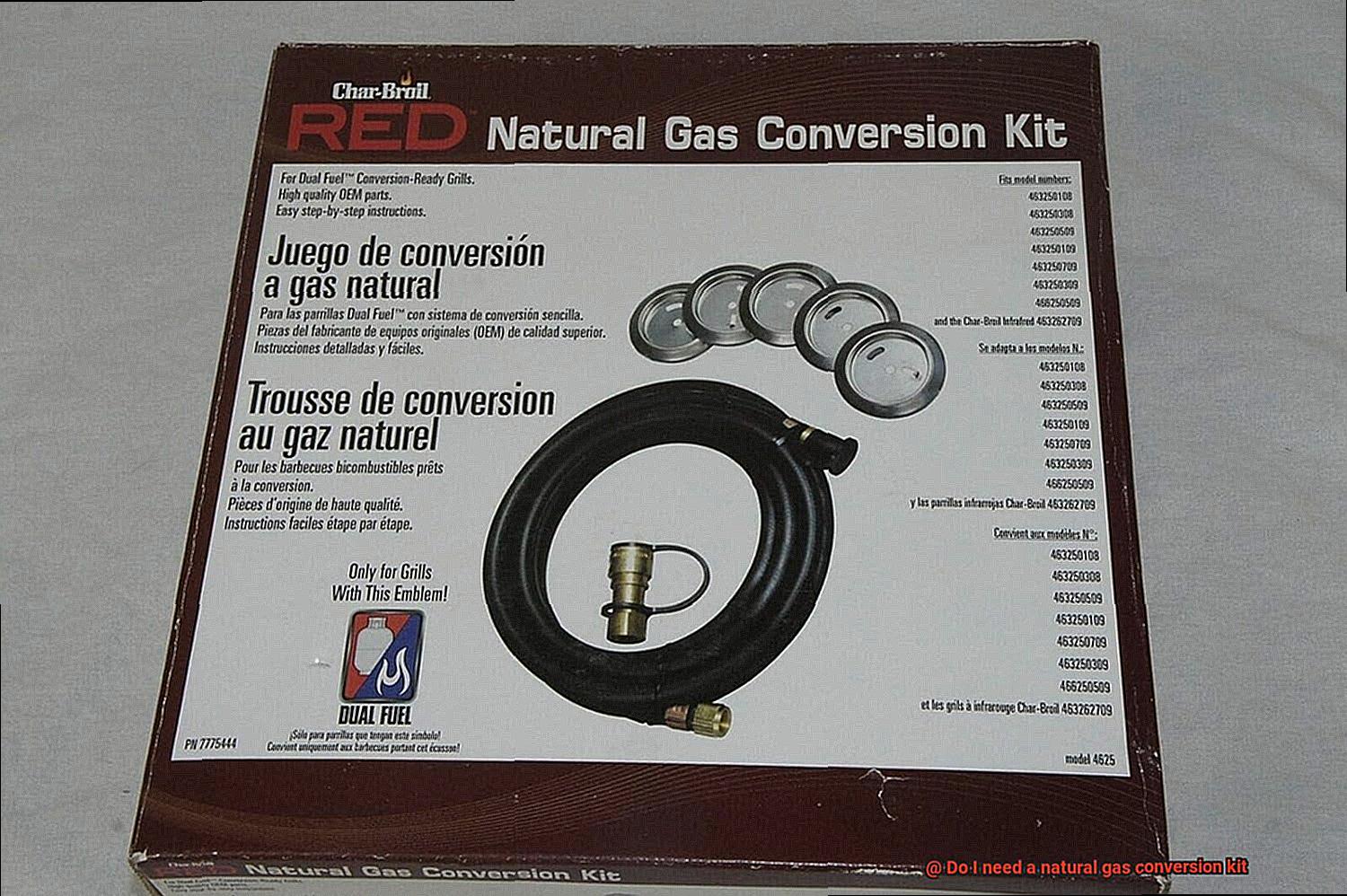
Finally, an outdoor-rated natural gas hose connects your grill to the supply line. It’s important to use a hose made from durable materials that can withstand exposure to the elements and high temperatures. A quality hose will ensure that your grill remains connected and functioning correctly.
Remember, it’s crucial to work with a qualified professional who can ensure proper installation and safety. With the right equipment and installation, grilling with natural gas can be a cost-effective, convenient, and eco-friendly way to cook outdoors. Say goodbye to propane tanks and hello to hassle-free outdoor cooking with natural gas.
Safety Considerations for Working with Natural Gas
While it’s true that natural gas is a safe and efficient fuel source, it can be dangerous if not handled properly. As an expert in the field, I’m here to highlight some of the top safety considerations you should keep in mind when working with natural gas.
First and foremost, gas leaks are a significant risk when working with natural gas. Leaks can lead to fires, explosions, and carbon monoxide poisoning. To ensure your safety, it’s essential to check all connections for leaks before firing up the grill. Always make sure that all connections are secure and that there are no leaks.
Another crucial safety consideration is the installation process. Converting a grill from propane to natural gas requires specific components and fittings that may not be compatible with your current setup. It’s crucial to consult a professional and follow all manufacturer instructions during the installation process to ensure that everything is installed safely and correctly.
Regular maintenance is also a crucial aspect of safe grilling with natural gas. By inspecting hoses and connections regularly for wear and tear, cleaning the grill often, and ensuring that all components are functioning correctly, you can minimize any potential risks.
To summarize, here are some key safety considerations for working with natural gas:
- Check all connections for leaks before use
- Consult a professional and follow manufacturer instructions during installation
- Regularly inspect hoses and connections for wear and tear
- Clean the grill often
- Ensure that all components are functioning correctly
VAI4wxXILdQ” >
Conclusion
Switching to natural gas appliances is a wise choice for homeowners who want energy efficiency and safety in their homes. But before you make the switch, it’s crucial to determine if your appliances require a natural gas conversion kit. The answer isn’t as simple as a yes or no, since different appliances have different requirements. Some may only need a burner or orifice change, while others may require more complex alterations to their internal components.
To ensure your safety and avoid dangerous gas leaks or explosions, it’s essential to consult with professionals and check with manufacturers before attempting any conversions yourself. It’s also important to note that not all grills are compatible with conversion kits, so doing your research beforehand is critical.
Despite the potential complications, switching to natural gas can offer many benefits such as cost-effectiveness, convenience, environmental friendliness, and consistent heat. With the right equipment and installation by qualified professionals, grilling with natural gas can be a safe and efficient way to cook outdoors. Just remember always to prioritize safety considerations like checking for leaks and inspecting hoses regularly for wear and tear.
In conclusion, making the switch to natural gas appliances requires careful consideration of several factors. However, once you’ve determined that your appliances are compatible with natural gas fuel sources and have undergone proper installation by experts in the field, you’ll enjoy all the benefits that come with them.

